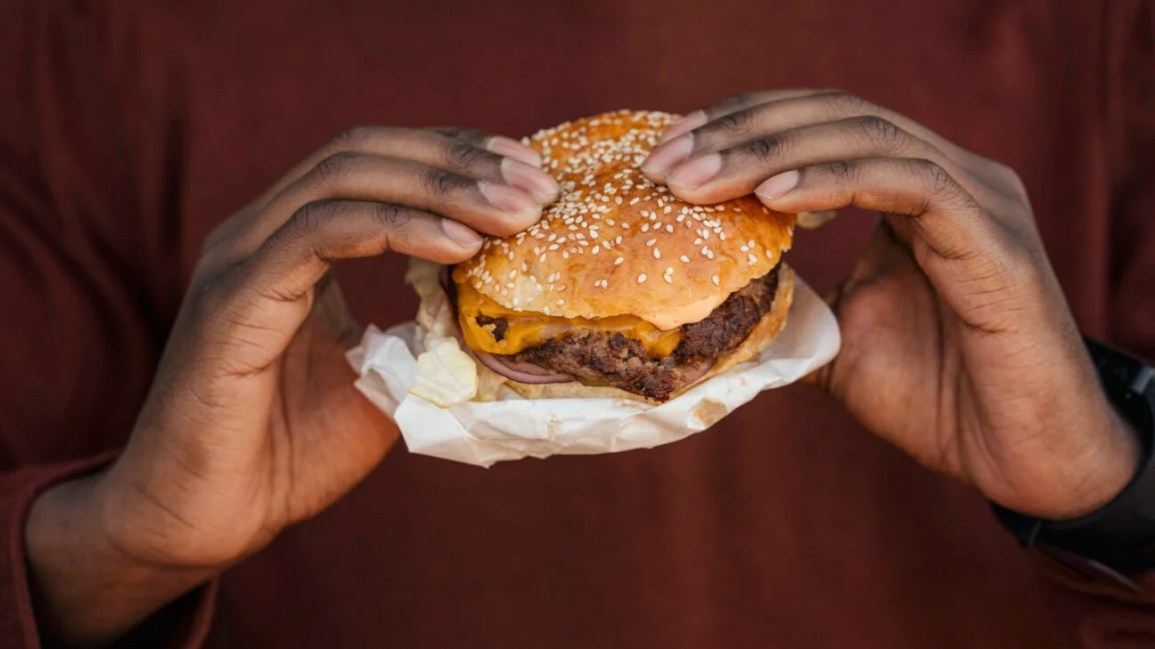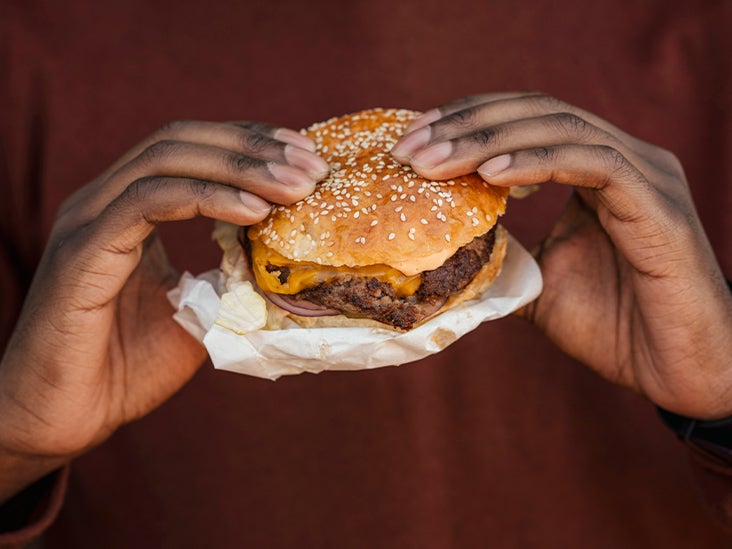
- Kevin Maginnis, 57, from Tennessee, gained TikTok fame for following an All-McDonald’s diet, swearing it helps him lose weight.
- Maginnis isn’t the first person to say the All-McDonald’s diet helped him lose weight, but nutrition experts warn it’s not healthy for a number of reasons.
- Consuming a diet that relies heavily on fast food can significantly increase the risk of chronic diseases like heart disease and type 2 diabetes.
Kevin Maginnis’ weight loss journey began in February. The 57-year-old from Tennessee shared it on TikTok (because it’s 2023). His method is unconventional.
“I know some of you think this might be crazy, but I’ll only be eating McDonald’s for the next 100 days,” Kevin Maginnis told his followers in his first TikTok video.
Maginnis, who posts under @bigmaccoaching, has amassed 77,000 followers since February. He also lost 40 pounds in 56 days.
He announced their progress Monday with a festive sausage, egg and cheese burrito.
However, his diet goes against standard nutritional advice.
“Fast food is part of the American diet and has been associated with high calorie intake and poor quality diets,” said the National Center for Health Statistics (NCHS).
So if this type of diet is so unhealthy, why is Maginnis successful?
Experts have explained why it loses weight and why they don’t consider the All-McDonald diet as a complete meal that will make your body happy.
Maginnis eats three McDonald’s meals and one snack a day. But his not-so-secret sauce: he cuts half of meals to speed up his weight loss.
So if he has a burger and fries, he’ll eat half of it and save the other half for another meal. In a February 21 video Announcing his plan, Maginnis said he wanted to show people that it’s not so much what you eat but how much you eat.
Maginnis also avoids sodas and drinking water.
Experts say the calorie deficit tips the scales in favor of Maginnis.
“This approach works for him because he’s consistently able to stay in a calorie deficit,” says Dr. Charlie Selzer, a Philadelphia doctor board-certified in obesity medicine and internal medicine who did a TikTok live with Maginnis. “If you ate fewer calories than you burn, you will lose weight no matter what you eat.”
Maginnis’ approach may seem surprising, but it is not new.
John Cisna claimed he lost 56 pounds, lowered his cholesterol, and lost a total of 21 inches on his chest, waist, and hips on an all-McDonald’s diet for six months. The science professor from Iowa has become a brand ambassador.
But a two-person case study isn’t enough for the all-McDonald’s diet to be endorsed by those who follow nutritional science.
“There are lots of ways to lose weight — some healthy and some not-so-healthy and everything in between,” says Virginia-based Jill Weisenberger, MS, RDN, CDCES, CHWC, FAND, author of Prediabetes: A Complete Guide, Second Edition. “I could lose weight by… swallowing a tapeworm or eating small amounts of food at fast food restaurants. I wouldn’t recommend any of these… ways to be healthy… He would lose weight with a similar calorie deficit whether he only ate apples, only candy or only McDonald’s meals.
Seltzer notes that weight loss has its benefits. For example, losing weight can help reduce the risk of disease.
But weight loss and the number on the scale are not the be-all and end-all of health.
Weisenberger says other markers of overall health include:
Also, how you lose weight is important.
“Rapid weight loss due to fad diets or extreme calorie restriction can be harmful to the body and lead to nutrient deficiencies,” says Beata RydygerBSc, RHN, Los Angeles-based Registered Nutritionist and Clinical Nutrition Advisor at Zen Nutrients.
Indeed, although a
Although Maginnis’ approach has not been studied, the effects of eating fast food in general have been.
“Eating a diet that relies heavily on fast food like McDonald’s can significantly increase the risk of chronic diseases like heart disease and type 2 diabetes due to high levels of saturated and trans fats, sodium, sugars added and additives present in these foods,” says Rydyger.
But McDonald’s foods may have nutritional value.
“Typical fast foods like burgers, chicken nuggets, and fries are a mixed bag,” says Weisenberger. “Yes, beef, chicken, and potatoes provide valuable nutrients, but they usually contain extra calories, saturated fat, or sodium — sometimes all three.”
Still, Weisenberger says what’s in the McDonald’s diet is as problematic as what’s not — high amounts of fruits, vegetables, whole grains and legumes (lentils, beans and peas).
“This leads to a deficit of disease-fighting vitamins, minerals, fiber and phytonutrients,” says Weisenberger. “By eating only McDonald’s meals, it is not possible to provide enough fiber for the gut microbiota or to consume enough polyphenols to reduce inflammation and fight chronic disease.”
Variety doesn’t just lead to nutritional deficiencies – it can get boring.
“[It’s] probably not sustainable due to lack of variety,” says Vanessa Rissetto, Dt.P., dietitian and CEO of Culinary Health. “Personally, I would get tired of eating burgers and fried foods day after day and only being able to eat one type of fruit or lettuce.”
And Rissetto worries that the focus on weight and calorie counting could also affect a person mentally.
“Obsessing on counting calories and everything you eat isn’t good for your mental health, and we want to think about how we communicate to people about what’s ‘healthy’ and how they can achieve that health. “, says Rissetto.
The all-McDonald’s diet’s lack of sustainability can be a silver lining — this diet is one to give up without guilt, experts say. Instead, Rydyger points out that variety is the spice of life and the hallmark of good nutrition.
“Eating a diverse range of foods is helpful because it ensures the body is getting all the nutrients it needs for optimal health,” says Rydyger. “Different foods contain different nutrients, so consuming a variety of foods helps ensure that the body is getting all the necessary vitamins, minerals, and macronutrients.”
One of these diets, the Mediterranean, has surpassed the US News and World Reports list of the best diets for six consecutive years. (The all-McDonald’s diet didn’t make a difference.)
The Mediterranean diet has been linked to many improved health outcomes, including
Rydyger didn’t name any names emphasizing a good diet. But she offered some tips for making one without labeling it as a certain meal plan.
“A better diet for overall health involves eating a balanced diet that includes a variety of whole foods, such as fruits, vegetables, whole grains, lean proteins, and healthy fats,” says Rydyger.
